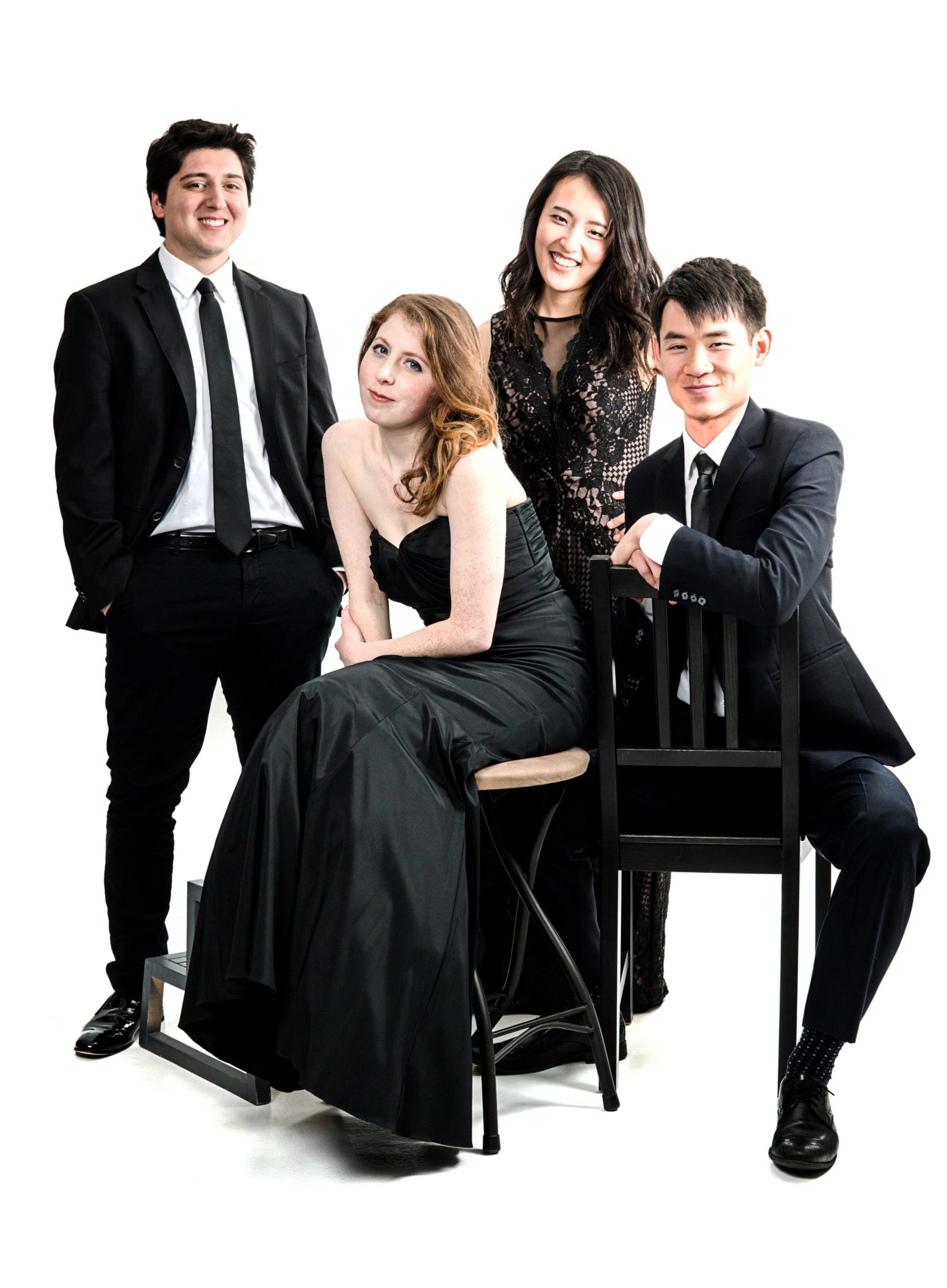
Courtesy of Matt Dine
Silence filled the room. Then, two notes, equal in pitch and duration, resonated through Sudler Recital Hall, followed again by instant silence. Melodic fragments and silence alternated for several minutes until the fragments developed into a full melody — so began “Blueprint” by Caroline Shaw MUS ’07.
On Monday, Oct. 28, the Omer Quartet — the School of Music’s fellowship quartet-in-residence — performed Shaw’s work alongside Ludwig van Beethoven’s “String Quartet No. 8” in E minor and Robert Schumann’s “Piano Quintet in E-flat major.” Faculty pianist and School of Music Deputy Dean Melvin Chen ’91 joined the quartet for the Schumann piece. The concert was the first of two featuring the same program. The second will be in Weill Recital Hall at Carnegie Hall on Thursday, Oct. 31 at 7:30 p.m.
“They’re very intelligent musicians,” Chen said. “Not only [do they] play well, they also really tell a story when they play, so I enjoyed hearing and working with them.”
The performances are the first of three sets of concerts in the Yale in New York series. According to the School of Music’s website, the series features pairs of performances, one in New Haven and one at Carnegie Hall, that showcase the “exciting collaborations that are the heart and history of the School of Music” between faculty, alumni and students. The series is under the artistic direction of faculty clarinetist
David Shifrin.
The Omer Quartet, comprised of violinists Mason Yu and Erica Tursi, violist Jinsun Hong and cellist Alex Cox, has performed together for almost a decade and was appointed quartet-in-residence at Yale in the summer of 2019.
According to Yu, Shifrin asked the quartet to program three works: one with a Yale affiliation, one that collaborated with a School of Music faculty member and another quartet piece of its choosing. The quartet chose the Shaw, Schumann and Beethoven, respectively.
Shaw’s “Blueprint,” which opened the program, was commissioned by the Wolf Trap Foundation for the Aizuri Quartet in 2016. The composer is the youngest recipient of the Pulitzer Prize in Music, which she won in 2013.
According to the concert’s program notes, the eight-minute piece features a wide array of musical timbres that form a “blueprint” tied together by a repeated eighth-note motif. Shaw often employs experimental instrumental sound production in her music. In “Blueprint,” various techniques, such as plucking the strings to create a snapping sound, create the “colors [that] bloom in the conversations between instruments,” the program notes read.
According to Yu, the quartet chose the piece because the members wanted an opportunity to learn Shaw’s compositional language before performing one of her commissions in 2020. The Shaw piece was inspired by Beethoven’s sixth string quartet.
“The [Shaw] has obvious ties to Beethoven, and it’s a Beethoven year,” Yu said, citing the 250th anniversary of Beethoven’s birth. “Caroline Shaw is a composer whose music we’ve been really interested in playing for a while.”
Like the Shaw, the Beethoven quartet began with two chords followed by silence, before launching into the movement’s lyrical yet rhythmic melody.
“Beethoven’s Op. 59 No. 2 quartet is one of the pieces that we felt we could give a really good performance of early on,” Yu said.
Pianist Zhen Tu ’21, whose chamber group is coached by Yu, attended the concert. “I could just tell that [the quartet members] were just so familiar with each other’s intentions even when they don’t explicitly say it,” Tu said. “All four of them are so involved and so in tune with each other.”
Beethoven’s eighth string quartet comes second in a series of three string quartets commissioned in the early 19th century by Russian Count Andreas Razumovsky. According to the concert’s program notes, it is “as contemplative as it is rich,” as it ranges in character from calm and stately to theatrical and nervous.
Although the concert showcases the quartet, Chen joins them for the concert’s final piece, the Schumann. Schumann wrote his piano quintet in 1842, the same year he wrote his many of his well-known chamber works.
“With the exception of the second movement which is a funeral march, [the quintet] is a very exuberant and joyous kind of piece, fun to play and fun to listen to,” Chen said.
According to Yu, adding a fifth member to an established quartet always adds a “new dimension” to the group, even while everyone “keeps their individual priorities.”
Chen, who has played the Schumann quintet many times before, said that the Omer Quartet brought a fresh perspective to the piece.
For example, the group experimented with taking a lighter and faster approach to the energetic final movement, “Allegro ma non troppo.” The audience responded with a standing ovation.
In January, the next Yale in New York concert will feature the Brentano Quartet, the School of Music’s faculty quartet-in-residence.
Phoebe Liu | phoebe.liu@yale.edu







